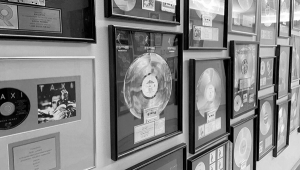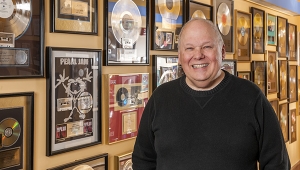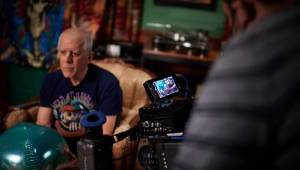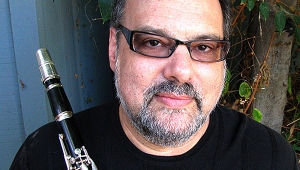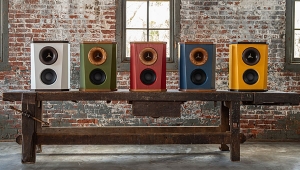| Columns Retired Columns & Blogs |
Tony Federici: Accurate in the USA Page 2
Federici: Right. And that allowed the speaker manufacturers to then create less expensive loudspeakers with a lot more freedom. About seven or eight years ago, it was only the very expensive loudspeakers that had the freedom of offering widely varying impedances because you needed very expensive amplifiers to drive them. We fed on the market and the market fed on us. And changed it radically, I think.
Atkinson: What was the stimulus for your Acurus line?
Federici: We brought out Acurus because, according to the dealers, there was a need for a lower-priced, US-made, properly made—we'll phrase it that way—amplifier line. A non-gimmick amplifier line that the independent dealer wanted to sell. Without going into names, other manufacturers that started out manufacturing in the US went offshore and started to be sold in chain stores. Once that occurred, the independents were saying, "Tony, can you do something, can you give us something in this price range, can you make it in America in this price range? Can you do it?" That was the impetus for Acurus.
Atkinson: How was it possible to make an amplifier in America that sells for less than $1000? The conventional wisdom is that to get high volumes at reasonable prices, a manufacturer has to move his production offshore.
Federici: The easiest way to answer it is that there is a price point below which you cannot manufacture in this country. So you have to be above that price point. If we wanted to make a $400 amplifier, as of right now, we can't figure out how to do it. It is possible to do it. But you change everything. You can't use glass-epoxy boards. You can't build it like the Acurus is built. You would have to completely change your entire manufacturing method, which then would not make it an "American" product in the eyes of the rest of the world. So you have to accept that you cannot go below a certain price point if you want to be true to what you're doing.
How did we pull it off? You need both dealer support and the quantity in order to reach certain price points if you're manufacturing in this country. But again, if you want to talk about a $400 amplifier, no matter what your quantity is, it really is almost impossible to do in the US. Not if you want to maintain a certain level of metalwork and so on.
Atkinson: And if you lose money on each sale, you can't make it up on volume.
Federici: Very difficult, I find. We're not a public corporation yet. [laughs] Aragon and Acurus are genuinely two different design philosophies. It's not Toyota rebadging certain models "Lexus" in the United States while they're still Toyotas in Japan. We didn't do that. The key to the Acurus was that once you realize, let's say, that you're talking $1000 for an amplifier, you have to face the reality of what speakers it will be used with. So you're no longer attempting to design, market, and sell the best amplifier in the world. You're attempting to design the "best" amplifier in the world for speakers costing $2500 and under—which aren't all that demanding loads, although they will, at least with the brands stocked by our dealer network, be going down to 4 ohms and sometimes to 2 ohms.
Atkinson: And Acurus also represents your foray into Home Theater amplification.
Federici: Home Theater is fundamentally the same business as audio. We see Home Theater as "legitimate." However, we don't believe it's been presented legitimately, at least so far. The only split between high-end audio and Home Theater is created by marketing. The problem has been that many of the people who are involved in Home Theater were not involved in audio. And many of those who were keep on insisting that the standards are different. The standards aren't different. The bottom-line standard for both audio and Home Theater is to reproduce the live event as accurately as possible. Anybody who tries to deviate from that standard is fundamentally incorrect.
Now if that means that the movie industry has to get the sounds more realistic, that the sound effects that they've been using all along sound artificial once played on the type of speakers that are used to reproduce audio as accurately as possible—if thunder now sounds like somebody taking a sheet of aluminum and shaking it—that's a problem for the movie industry, not the audio industry. The movie industry now has to realize what we're capable of reproducing and come along with it.
But we've always had these problems. Even with records, the music may be excellent but it's still a lousy recording. The problem of trying to incorporate pop music in a high-end system can be just as difficult as that of incorporating movies into a high-end system. It's the same problem.
The problem is the way the industry is affected, not by the mass market of audio, but by the mass market of music. Twenty years ago, I would say most people knew what a live instrument sounded like. Today everything is miked. What they call "unplugged" is, in fact, acoustic instruments plugged-in. Even many classical concert halls now have hidden speakers to "help out" the sound.
- Log in or register to post comments

